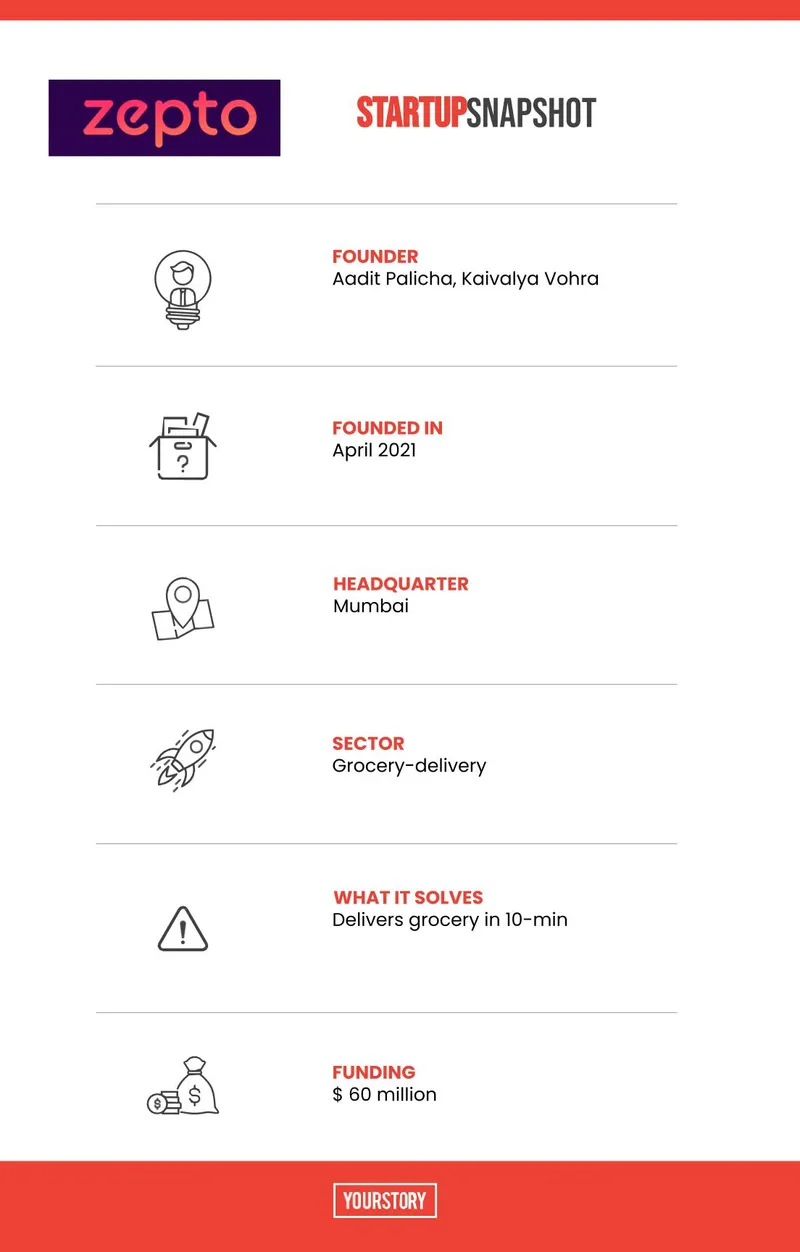This startup by two 19-year-old Stanford dropouts is disrupting the grocery delivery space
With prominent players like Swiggy Instamart, Dunzo, etc., in the grocery delivery space, Mumbai startup Zepto claims to see 200 percent monthly growth, with a retention rate of 78 percent.
Nineteen-year-old entrepreneurs Aadit Palicha and Kaivalya Vohra returned to Mumbai from Stanford University last year and had a difficult time getting groceries delivered in their area.
The teen entrepreneurs had collaborated on several projects, including a ride-hailing commute app for school kids.
Disheartened by the execution, the duo found an opportunity in the hyperlocal grocery delivery market and launched (formerly known as Kiranakart) in April this year.
Speaking to YourStory, Aadit says, “I think, a lot of the competition in the space is either in mis-executing grocery delivery or is focused on multiple different models, which is where we saw the opportunity.”
The USP
Zepto promises grocery delivery in 10 minutes (up to 90 percent of orders) through a network of dark stores and micro warehouses.
Wanting to provide a frictionless delivery experience, Aadit says the startup’s median delivery time is 8 mins 47 seconds.
The Mumbai-based startup operates on a hub-and-spoke model through a network of dark stores or retail distribution centres, catering exclusively to online shopping.

Zepto
Dark store model
A dark store is a small neighbourhood warehouse where consumers cannot enter directly and can only order online for home delivery. While dark stores are not new to the Indian market, the model is yet to be fully explored, Aadit says.
“The magic of this model is how we pack and dispatch goods in under 60 seconds. The last mile is like any other delivery model,” he explains.
Zepto claims its network is better optimised with the use of location intelligence and geospatial data, including geography, demography, road patterns, traffic dynamics, weather, last-mile supply availability, real estate prices, etc.
Besides, the startup’s dark stores and cold rooms are custom-designed specifically to meet requirements such as ease of navigation, allowing packers to move as quickly as possible to pack the items in an order.
These packers use tablets to know where each item is stored and get an optimal route to pick them all up.
Aadit says, “From the time a customer checks out of the app till their groceries are packed and dispatched — the entire process takes 60 seconds or less.”
He adds the actual delivery time may differ from customer to customer. According to Aadit, each customer gets their custom estimated time of delivery, enabling Zepto to keep expectations in check and meet the promised delivery time.
He says, “An overwhelming majority of all orders are fulfilled under 10 minutes. However, one percent of the orders might take 15-16 minutes or a little more.”
The startup works with contractors or gig worker partners for its delivery fleet. Based on predictive analysis and data trends, Zepto allocates delivery partners before it starts getting orders.
Moreover, Zepto’s AI-powered tools help keep inventory levels as high as possible and allocate drivers intelligently.
With a tech office in Bengaluru and operations headquarters in Mumbai, Zepto has built out a strong team of 300 members to manage its pace of growth.
The grocery delivery startup’s management includes senior leaders from some of India’s largest startups, including , , , , and , to name a few.
At present, Zepto is hiring rapidly across engineering, operations, marketing, and finance verticals.
Market size and competition
According to , India’s online food and grocery retail market is expected to touch $10.5 billion (1.2 percent) of the overall retail market by 2023.
Last year, amidst the COVID-19 pandemic, online grocery players gained traction. However, they need to look beyond the availability of new products or discounts to gain market share. The competition has now boiled down to how quickly deliveries are made.

YS Design team
Zepto competes with Swiggy Instamart, which promises deliveries within 15-30 minutes, followed by that plans to launch 10-minute grocery deliveries in 10 cities.
Besides, it also competes with , which delivers groceries in 19 minutes in Bengaluru through its Xpress Mart dark store network.
While Zepto did not reveal its monthly active users or the number of orders it has fulfilled to date, Zepto claims to see a 200 percent monthly growth, with a retention rate of 78 percent.
“The data speaks for itself. Once we started delivering in 10 minutes, our NPS (net promoter score) shot up and has constantly remained at around 85, with a 50 percent weekly user retention rate, which shows the incredibly strong customer love for our product,” he explains.
At present, the startup is targeting 100 dark stores by early 2022 across India.
Funding and way ahead
Present in Bengaluru, Mumbai, and Delhi, Zepto plans to further expand in these cities and launch operations in Hyderabad, Pune, Kolkata, and Chennai in the next 30 days.
This week, Zepto said it raised an early-stage round of $60 million led by Glade Brook Capital, Nexus, and Y Combinator. Angel investors, including Lachy Groom, Neeraj Arora, and Manik Gupta, among others, also participated in the round.
With this round, the online grocery delivery startup is now valued at between $200 - $300 million.
Speaking to YourStory, Suvir Sujan, Managing Director, Nexus Venture Partners, said, “The Indian startup ecosystem has consistently shown us that bulletproof focus, fast-paced execution, and a strong team-building from the ground up always beats slower incumbents experimenting with multiple different business models.”
He added, “Zepto is a rare combination of all three of those ingredients, and it reflects in the overwhelming customer love for their product. That’s why we’re confident Zepto will be a big long-term winner in the Indian Q-Commerce.”
Edited by Suman Singh








